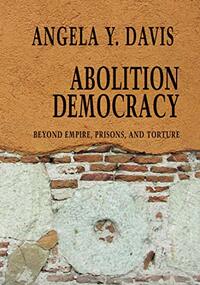Take a photo of a barcode or cover
challenging
informative
medium-paced
Really enjoyed this! She has an awe-inspiring voice and writes in a very direct and interesting way.
informative
reflective
medium-paced
Content alone gets 5 stars, but it was hard to follow in interview form. I suppose it was meant to remind me of classic philosophy, question-and-answer style, but it would have been easier to read in chapter form, and I got lost along the way.
challenging
informative
slow-paced
challenging
informative
inspiring
reflective
medium-paced
informative
reflective
fast-paced
A wonderful collection of interviews with the great Angela Davis. A lot of good discussion which I think is valuable for anyone interested in abolition thought.
Foundational text on abolition.
Some quotes from the last chapter that made me reflect:
“Organizing is not synonymous with mobilizing. Now that many of us have access to new technologies...we need to give serious thought about how they might best be used. The internet is an incredible tool, but it may also encourage us to think that we can produce instantaneous movements, movements modeled after fast food delivery.”
“When organizing is subordinated to mobilizing, what do you do after the successful mobilization? How can we produce a sense of belonging to communities ins truffle that is not evaporated by the onslaught of our everyday routines? How do we build movements capable of generating the power to compel governments and corporations to curtail their violence? Ultimately, how can we successfully resist global capitalism and its drive for dominance?”
And last quote:
“I often remark that young people today have too much deference toward the older organizers, the veterans and are much too careful in their desire to rely on role models. Everyone wants some tuna eater that what they do will have palpable results. I think the best way to figure out what might work is simply to do it, regardless of the potential mistakes one might make. One must be willing to make mistakes. In fact, I think that the mistakes help to produce the new modes of organizing—the kinds that bring people together and advance the struggle for peace and social justice”
Some quotes from the last chapter that made me reflect:
“Organizing is not synonymous with mobilizing. Now that many of us have access to new technologies...we need to give serious thought about how they might best be used. The internet is an incredible tool, but it may also encourage us to think that we can produce instantaneous movements, movements modeled after fast food delivery.”
“When organizing is subordinated to mobilizing, what do you do after the successful mobilization? How can we produce a sense of belonging to communities ins truffle that is not evaporated by the onslaught of our everyday routines? How do we build movements capable of generating the power to compel governments and corporations to curtail their violence? Ultimately, how can we successfully resist global capitalism and its drive for dominance?”
And last quote:
“I often remark that young people today have too much deference toward the older organizers, the veterans and are much too careful in their desire to rely on role models. Everyone wants some tuna eater that what they do will have palpable results. I think the best way to figure out what might work is simply to do it, regardless of the potential mistakes one might make. One must be willing to make mistakes. In fact, I think that the mistakes help to produce the new modes of organizing—the kinds that bring people together and advance the struggle for peace and social justice”




